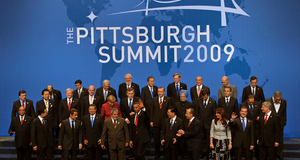Turning Crisis into Opportunity: How Global Economic Institutions Can Use COVID-19 to Address Global Challenges
By
2021, Vol. 13 No. 09 | pg. 1/1 AbstractThe COVID-19 crisis has exacerbated current global challenges. However, this article argues that this time of crisis can also be a unique opportunity for the existing global economic institutions - G20, WTO, IMF, and World Bank (WB) - to make the necessary improvements that are needed to effectively address the global challenges of our time. First and foremost, these challenges include the immediate health crisis, climate change, and global inequality. The opportunity has come to become effective altruists, that is, to do the best possible for people who are worse off at a moderate cost to oneself. The article presents a wide range of expert solutions to these challenges - political will is needed to seize the opportunity. Time has come for the international community to become effective altruists, i.e., to do the best possible for people who are worse off, at moderate cost to oneself. This article argues that the COVID-19 crisis has aggravated current global challenges and yet offers a unique opportunity for global economic institutions, and the influential states behind them, to find the best possible solutions to these challenges – in short, to use the crisis as a chance for improvement. In particular, it examines how the global economic institutions - G20, WTO, IMF, and World Bank (WB) - can best address three related global challenges: the immediate COVID-19 crisis, climate change, and global inequality. A wide range of expert solutions is presented - it requires political will to realize them. In the short-term, COVID-19 has caused social and economic disruption with regionally differentiated impact on poverty, inequality, and well-being (Escobari & Yeyati 2020). Since advanced economies have much more influence to change global economy, it is up to them to initiate COVID-19 mitigation and sustainable recovery through reform and deployment of global economic institutions. So far, IMF and WB have deployed an unprecedented financial stimulus to mitigate the social and economic impact of the pandemic (Verbeek 2021). Therefore, global economic institutions were already able to protect the most vulnerable from the gravest economic and social consequences. Some actions such as the OECD/G20 Framework for fair taxation (OECD 2020a) or the focus on sustainability in the recovery plans of the EU, G7, and public development banks (OECD 2020b) promise further success, but problems in multilateral cooperation are already looming in the global distribution of the soon-to-be-available COVID-19 vaccine (Peel 2020). All this is not enough – a major reallocation of capital towards sustainable and socially inclusive economy will be necessary (Kharas & McArthur 2020).During the pandemic the role of the state has grown and global supply chains have become more protectionist. Active government industrial policy increases the likelihood of retaliatory circles (Dervis 2020). Therefore, and due to the common values enshrined in the SDGs and the Paris Agreement, it is in state interest to strengthen international cooperation at all levels in order to address the consequences of the global health, climate, and economic challenges together. What will the endgame of the COVID-19 vaccine race look like? The current national-level approach remains a recipe for disaster in view of global economic-social interdependence. Accordingly, a global vaccine initiative under the auspices of the UN, G20, or somewhere else is urgently needed (Haass 2020). The immediate health and economic crisis reenforces the urgency of combating the medium-term issue of climate change and opens the opportunity to implement reforms during the recovery. Current fragmentized global climate governance (Widerberg, Pattberg, and Kristensen 2016) produces mixed results due to the malignant issue structure: sustained cooperation over many decades is needed with strong incentives to defect (Keohane & Victor 2016). Initial attempts to achieve binding emission targets have given way to the Paris Agreement, which allows states to determine their own commitment - an important departure from previous gridlock and a starting point for deeper cooperation (Victor 2016). In 2020, it is clear that this formula is too unambitious and will not be sufficient to limit temperature rise to 2% (ibid.). How can global economic institutions help states to reduce emissions? A first proposal is the creation of economic institutions - climate clubs - which combine economic advantages such as free trade with strict emission reduction targets. Countries could be penalized if they do not meet their commitments or do not join (Maizland 2020). Another proposal is the creation of sector-specific climate clubs within the framework of the G20 or other intergovernmental institutions (ibid.). A second proposal is to link the lending policy of IMF and WB to environmental conditionalities, which means rethinking the Washington Consensus. The IMF and the WB can be a vessel for environmental norm spread and linkage of environmental policy with co-benefits (Park & Vetterlein 2010). Furthermore, international financial institutions (IFIs) can provide a knowledge and coordination hub for states, sub-state governance actors, and private actors (Pipa & Bouchet 2020). Thereby, they can push the most important climate club - the G20 - in a more climate-friendly direction. A third proposal is carbon border adjustment reform in the WTO, i.e., adapting WTO rules to allow for a certain degree of climate subsidy, so that climate-friendly products with higher costs in a free market are not worse off than climate-unfriendly but cheaper products (Doelle 2004). A fourth proposal could be a carbon tax that is globally institutionalized in the IMF/WB framework, which would include carbon pricing and the elimination of fossil fuel subsidies. Exceptionally low prices for fossil fuels in the aftermath of the pandemic offer an opportunity to accelerate such a process (Bhattacharya 2020). Although the G20 agreed in 2019 to more ambition towards sustainability, inclusiveness, and climate change mitigation (Goodman 2019), and although a new momentum is expected from a re-accession of the US to the Paris Agreement (Newburger 2020), the climate crisis is worsening rapidly. The world must simultaneously tackle health and climate crisis (Howard 2020). The pandemic has set out a roadmap: Massive investment to replace polluting capital and to address infrastructure deficits and structural change in developing countries in order to enable a new form of growth - with the long-term goal of global net zero emissions by 2050 (Bhattacharya 2020). This implies the need for a timely commitment to a global target of net zero by 2050 as a benchmark for climate action. A growing number of major emitters are already participating. Furthermore, this means making green and sustainable recovery the centerpiece of global cooperation. Active sustainable recovery allows for powerful co-benefits including reduced congestion and pollution (ibid.). In the long-term, economic inequality and its consequences can be seen as the greatest challenge (Milanovic 2016, 18-20). COVID-19 has worsened inequalities between developed and developing countries, but also between social groups within countries. While the immediate priority of the IMF and WB is to protect from the immediate health and economic crisis, subsequent policies must address the structural drivers of inequality (Qureshi 2020). One main factor for rising inequality is technological change. Digital technologies have caused a transformation of markets and labor whose benefits are highly unequally distributed (ibid.). The pandemic accelerates the digital transformation, fortifying the shift towards more oligopolistic, less competitive markets and tilting labor markets against low-skilled workers (Strauss 2020). In addition, the redistributive role of the state has become weaker in many places in recent years (ibid.). Global economic institutions can help states in increasing long-term productivity growth, especially through thought leadership with regard to stable macroeconomic and growth-friendly institutional environments. IMF/WB are in a position to disseminate best practices globally and to assist states in implementation processes through advisory and conditionalities. What needs to be done? First, competition policies need to be revised for the digital age to check the growth of monopolistic structures through regulatory reform and stronger antitrust enforcement. New ideas are needed to broaden capital ownership and reform corporate governance to reflect counter stakeholder interests. (Dieppe & Kose 2020) Second, the innovation ecosystem should contain a broader diffusion of technologies embodying new knowledge. A reform of the patent regime and more effective use of public investment and tax policies on research and development can "democratize" innovation. (ibid.) Third, biases in the tax system which favor capital over labor and give incentives towards "excessive automation" - destroying jobs without enhancing productivity - should be corrected. (ibid.) Fourth, digital infrastructure and digital literacy and wider education and training must be boosted. New programs for worker upskilling, reskilling, and lifelong learning that respond to shifts in demand for skills may need new models of public-private partnerships (Vrana 2016). The IMF and WB can disseminate the standard of most advanced economies of close state-labor-business collaboration for the provision of retraining programs, lifelong development, information, and broader labor protection through advisory and conditionality (Graham 2020). Fifth, labor market policies must improve worker mobility in order to replace protectionism with fast access to new jobs. In addition, social safety nets need to be overhauled as the market today is characterized by more frequent job transitions and more diverse work arrangements (Gallant et al. 2020). Sixth, the IMF and the WB can play an advisory and implementation role in creating international cooperation on tax matters and diversification of trade relations. An overhaul of the tax system is necessary in view of the challenges of a digitalized economy, where global cooperation is essential. The diversification of supply chains will lead to increased diversity, resilience, trade, FDI, and knowledge transfer to countries less well integrated in global value chains (Dieppe & Kose 2020). Seventh, it is recognized that the pandemic has brought with it significant emotional and mental health costs, so that renewed economic growth is not enough to sustain sustainable economies and societies (Graham 2020). Accordingly, international promotion by IFIs of economic models and policy priorities that incorporate well-being can better prepare countries for future crises (ibid.). The COVID-19 pandemic has highlighted that the IFIs - IMF, WB, WTO - need reform to provide a better global financial safety net and trade network, with more protection for emerging market and developing countries (EMDEs) and fair-trade practices. Even before COVID-19, the global economic architecture was in need of reform because of the evolving dynamics of the global economy. What are necessary reforms? First, development banks should incorporate a mechanism that systematically adjusts IMF lending capacity to the increasing complexity of the financial system and the size of the economy. The current resources, 1 trillion dollars (1.1% of global GDP), are still insufficient to manage systemic crises like COVID-19. And as GDP grows again, IMF resources will become smaller in relative terms. (Coulibaly & Prasad 2020) Second, the IMF's ability to create new Special Drawing Rights (SDRs) should be applied systematically as a complement to existing lending facilities. A new mechanism should redirect the large number of unused SDRs of better resourced countries to more needy countries. (ibid.) Third, bilateral swap agreements, which are an important tool during global shocks, should be made systematically available to EMDEs to alleviate foreign exchange liquidity shortages. Institutionalized mechanisms for emergency liquidity assistance would be more effective and would prevent excessive reserve accumulation, which is inefficient at national and global level. (ibid.) Fourth, the COVID-19 pandemic has elevated the danger of a closed global trading system with separate American and Chinese spheres, which would be a disaster for global economic development. An updated WTO agreement that addresses new issues such as cross-border data flows, services, intellectual property rights, and state enterprises is necessary. A first step towards this could be a new comprehensive trade agreement between China and the US. (Dollar 2020) An insufficient global safety net has forced the G20 to adopt a debt standstill initiative (DSSI). Strong support from IMF shareholders will be needed to implement some of the above reforms, but the legitimacy of IFIs depends on it (ibid.). Strong political will on the part of the US and China will be necessary to resolve the trade war constructively. This article has highlighted the opportunity for the global economic institutions to assist in rebuilding a more sustainable and inclusive world. A range of solutions were proposed on how to best address COVID-19, Climate Change, and Global Inequality -, which can be categorized as: 1.) dissemination and implementation support through conditionality and advisory of necessary social and economic policy adjustments by IMF and WB; 2.) institutional and normative reform of IMF, WB, WTO for more legitimacy and effectiveness; and 3.) creation of climate clubs, i.e. economic institutions that connect economic benefits with sustainable policies. All these solutions require a renewed will of states to engage in sustained cooperation. This can be provided to a certain degree by co-benefits, but also requires morality, i.e., the will to shape IFIs into platforms that make a greater difference for all and not just for narrow interests - some effective altruism cannot be too much to ask. ReferencesBhattacharya, A. (2020, November 20). Rebooting the climate agenda: What should the priorities be? Retrieved from https://www.brookings.edu/research/rebooting-the-climate-agenda-what-should-the-priorities-be/. Coulibaly, B., & Prasad, E. (2020, November 17). The international monetary and financial system: How to fit it for purpose? Retrieved from https://www.brookings.edu/research/the-international-monetary-and-financial-system-how-to-fit-it-for-purpose. Derviş, K. (2020, November 17). Multilateralism: What policy options to strengthen international cooperation? Retrieved from https://www.brookings.edu/research/multilateralism-what-policy-options-to-strengthen-international-cooperation/. Dieppe, A., & Kose, M. A. (2020, November 17). The global productivity slump: What policies to rekindle? Retrieved from https://www.brookings.edu/research/the-global-productivity-slump-what-policies-to-rekindle/. Doelle, M. (2004). Climate Change and the WTO: Opportunities to Motivate State Action on Climate Change through the World Trade Organization. Review of European Community and International Environmental Law, 13(1), 85-103. Dollar, D. (2020, November 17). The future of global supply chains: What are the implications for international trade? Retrieved December 5, 2020, from https://www.brookings.edu/research/the-future-of-global-supply-chains-what-are-the-implications-for-international-trade/. Escobari, M., & Yeyati, E. L. (2020). Dislocation of labor markets: What policies to mitigate the shock? Retrieved from https://www.brookings.edu/research/dislocation-of-labor-markets-what-policies-to-mitigate-the-shock/. Gallant, J., Kroft, K., Lange, F., & Notowidigdo, M. J. (2020, September 28). Temporary unemployment and labor market dynamics during the COVID-19 recession. Retrieved from https://www.brookings.edu/bpea-articles/temporary-unemployment-and-labor-market-dynamics-during-the-covid-19-recession/. Goodman, M. (2020, December 07). Parsing the Osaka G20 Communiqué. Retrieved from https://www.csis.org/analysis/parsing-osaka-g20-communiqué. Graham, C. (2020, November 17). The human costs of the pandemic: Is it time to prioritize well-being? Retrieved from https://www.brookings.edu/research/the-human-costs-of-the-pandemic-is-it-time-to-prioritize-well-being/. Haass, R. (2020, July 15). Will a vaccine be free-for-all? Or just a free-for-all? Retrieved from https://www.irishexaminer.com/opinion/commentanalysis/arid-40016096.html. Howard, C. (2020, December 03). COVID-19 recovery is an opportunity to tackle worsening climate crisis: New report. Retrieved from https://theconversation.com/covid-19-recovery-is-an-opportunity-to-tackle-worsening-climate-crisis-new-report-151242. Keohane, R. O., & Victor, D. G. (2016). Cooperation and discord in global climate policy. Nature Climate Change, 6(6), 570-575. Kharas, H., & McArthur, J. (2020, November 17). Sustainable Development Goals: How can they be a handrail for recovery? Retrieved from https://www.brookings.edu/research/sustainable-development-goals-how-can-they-be-a-handrail-for-recovery/?utm_source=feedblitz&utm_medium=FeedBlitzRss&utm_campaign=brookingsrss/topics/economic. Maizland, L. (2020). Global Climate Agreements: Successes and Failures. Retrieved from https://www.cfr.org/backgrounder/paris-global-climate-change-agreements. Milanović, B. (2016). Global inequality: A new approach for the age of globalization. Cambridge, MA: Harvard University Press. Newburger, E. (2020, November 20). Biden will rejoin the Paris Climate Accord. Heres what happens next. Retrieved from https://www.cnbc.com/2020/11/20/biden-to-rejoin-paris-climate-accord-heres-what-happens-next-.html.. OECD. (2020a). Statement by the OECD/G20 Inclusive Framework on BEPS on the Two-Pillar Approach to Address the Tax Challenges Arising from the Digitalization of the Economy. Retrieved from https://www.oecd.org/tax/beps/statement-by-the-oecd-g20-inclusive-framework-on-beps.htm. OECD. (2020b). Making the green recovery work for jobs, income and growth. Retrieved December 5, 2020, from https://www.oecd.org/coronavirus/policy-responses/making-the-green-recovery-work-for-jobs-income-and-growth-a505f3e7/. Park, S. & Vetterlein, A. (2010). Owning Development: creating policy norms in the IMF and the World Bank. Cambridge University Press. Peel, M. (2020). 'Vaccine nationalism' delays WHO's struggling Covax scheme. Retrieved from https://www.ft.com/content/502df709-25ac-48f6-aee1-aec7ac03c759. Pipa, A. F., & Bouchet, M. (2020, August 07). How to make the most of city diplomacy in the COVID-19 era. Retrieved from https://www.brookings.edu/blog/up-front/2020/08/06/how-to-make-the-most-of-city-diplomacy-in-the-covid-19-era/. Qureshi, Z. (2020, November 17). Tackling the inequality pandemic: Is there a cure? Retrieved from https://www.brookings.edu/research/tackling-the-inequality-pandemic-is-there-a-cure/. Strauss, D. (2020, November 03). Pandemic hits poor hit hardest as inequality rises. Retrieved December 5, 2020, from https://www.ft.com/content/750eb552-639e-4fa0-941b-4f3f57f1a8d4. Verbeek, N. (2021, forthcoming). The Future of IMF and World Bank: New Dynamics in Times of COVID-19 Crisis, 2020. In Hosli, M.; Garrett, T.; Niedecken, S.; Verbeek, N. (Eds.). The Future of Multilateralism: Global Cooperation and International Organizations. Rowman & Littlefield. Victor, D. G. (2016). What the Framework Convention on Climate Change Teaches Us About Cooperation on Climate Change. Politics and Governance, 4(3), 133-141. Vrana, R. (2016). Digital Literacy as a Boost Factor in Employability of Students. Communications in Computer and Information Science, 169-178. Widerberg, O. E., Pattberg, P. H., & Kristensen, K. E. G. (2016). Mapping the Institutional Architecture of Global Climate Change Governance V.2. Institute for Environmental Studies/IVM. Retrieved from http://fragmentation.eu/wp-content/uploads/2016/06/Technical-report-Climate-change-R16-02-FINAL.pdf. Suggested Reading from Inquiries Journal
Inquiries Journal provides undergraduate and graduate students around the world a platform for the wide dissemination of academic work over a range of core disciplines. Representing the work of students from hundreds of institutions around the globe, Inquiries Journal's large database of academic articles is completely free. Learn more | Blog | Submit Latest in International Affairs |
















